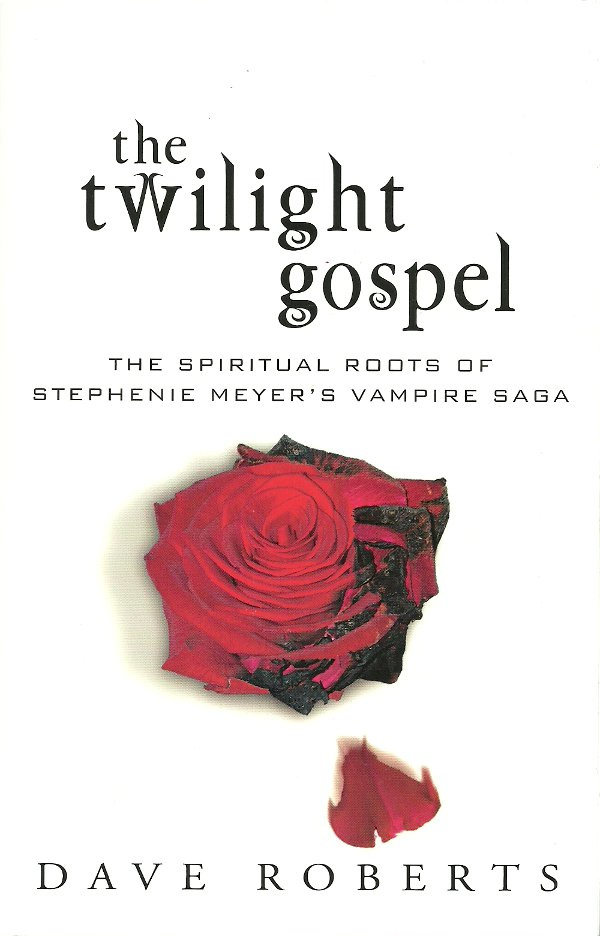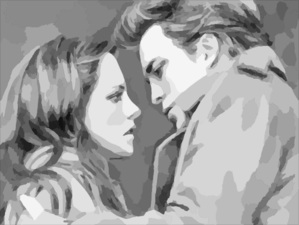Casting Light Against Dark In ‘The Twilight Gospel’
Though I’m a man, I can now say I’ve read a Twilight book. Is that all right? Even if it’s not, I will get away with it: this was a nonfiction book, The Twilight Gospel, by British author Dave Roberts to explore the series’s good and bad themes from a Biblical yet unique perspective.
That’s right. American evangelicals are constantly writing about The Christian View of British fantasies such as Harry Potter. It’s high time that process was reversed. No, I’d not previously heard of this book until a friend loaned it to me.1 But we likely need to have a book like this for every popular story that Christians condemn or dislike.
No, I’m not a Twilight fan. I couldn’t be. It’s not my kind of story. As if vampires and other Halloween dress-up creatures didn’t already bore me, a marketing cry of “teen romance! only with vampires!” even further drains my interest. (Insert vampire-themed analogy.) It may not be your favorite story either, but hordes of teen girls and older women and even fine Christian moms like those from my Gospel-fearing church crave this stuff.
We can’t condemn Twilight like fundies. We need to know what’s in the thing.
Roberts is a man for the job. First, he read the entire series and (presumably) can still feel like a man. Second, his work is well-written, balanced, and Biblical, and as I said above, also unique. You won’t read an American evangelical Christian author who in one chapter critiques the series’ sex-glorification, then also takes a whole other chapter to analyze the characters’ anti-environmentalism and materialism.
It’s just those kinds of unlikely pair-ups that made me re-realize: Hey, both of those sins are un-Biblical — not just the sexual obsession, but the environmental destruction. By contrast, an American author would focus only on the sex obsessions. It takes a Brit to fault both.
Make no mistake: Roberts pulls no punches, but he’s also positive. After all, any story that is well-written and/or popular contains reflections of light in the darkness. Or as he puts it:
As you wander the Twilight lands, you’ll find grace, beauty and truth in the midst of moral complexity and spiritual promiscuity.
I want to acknowledge wisdom where we find it in the story, and to respect the fine storyteller who brings us the tale. We should be willing to stand in the shoes of other readers who come to this story with different expectations, backgrounds and experiences. But as we seek to understand why the story touches them, I hope we will also be willing to question and refute, and perhaps, when necessary, say ‘this I have against you’.2
1. Reviewing vampires. Chapter 2’s history lesson may be old hat to paranormal fantasy fans, but it helped me learn exactly where vampire myths came from at all. All I had known was that internet nerds accused Twilight author Stephenie Meyer of “ruining” vampires with her images of creatures who don’t recoil from crosses and who do sparkle in the sunlight like gods.
That accusation is partly true, Roberts would say: “[Twilight] has both embraced and set aside aspects of the conventional vampire genre” (37). So what about these “good” monsters? Too much subversion? Like the stories, he says, they reflect mixed morality.
2. Beauty queens. Another one of Twilight’s themes concerns Roberts far more: its unhealthful fixation on physical attractiveness. Good characters, compared with obviously nasty ones, get off easy — and therefore whatever they believe or do looks good to readers who don’t discern, the author says (54). But even Meyer’s portrayals of less-attractive yet decent side characters couldn’t last, not into the film versions that tend to make the good people pretty (perhaps with “metrosexual sensibility,” 58) and the villains or fools ugly.
3. Alice avarice. Roberts spends a whole chapter critiquing the rampant materialism of one vampire character. “These books hold up some of the more endearing characters in this epic tale as living lives of unfettered luxury using money unfairly gained—and through occult power, moreover” (80). This, to me, sounds more like thoughtless wish-fulfillment, the same kind that puts Jason Bourne always in fine hotels and Dan Brown gushing over the lavish surroundings of his latest silly religious-conspiracy thriller. Roberts faults Meyer for this thoughtlessness. She sinfully omits scrutinizing this behavior, he says (81).
4. Sexy story. Here he touches on the topic that’s brought the most Christian scrutiny to Twilight, and his critique may seem familiar. I did wish for more here — such as asking why Christians tend to let Twilight off the hook only because it doesn’t (at first) directly depict physical sex, but does indulge in emotional arousal and obsession. But this chapter is solid.
5. ‘The Occult Sting.’ Loved the title here, suggestive of the objectionable element’s sting, not a total devouring. Most readers can dismiss the notion that vampires (or fantasy worlds such as in Harry Potter) may exist, Roberts writes. But he asks: how many constantly hear — from Meyer’s Mormon myths or even the Gnostic notions of Da Vinci Code author Dan Brown — that only special, learned human beings have Holy Spirit-style charismatic gifts?
Final critiques. Roberts finishes by discussing of Meyer’s own brief explorations of free choice for humans and for spiritually dark creatures. Could they be redeemed? Like Meyer herself, Roberts doesn’t pursue the question further. “But in a culture where personal responsibility is often marginalized by voices that say we have the right to follow our impulses, her raising of the subject is welcome,” he concludes (148).
Conclusion. Read at least one Twilight book: this one, even if you’re male. It’s an enjoyable and in-depth read, and can only help to help you explore this popular story and others.
- Now after this review, she can finally have it back. ↩
- Roberts, Dave. The Twilight Gospel, page 23 (2009, Monarch Books). The last phrase is a reference to Rev. 2:20: Jesus’ condemnation of church members who “practice sexual immorality and to eat food sacrificed to idols.” ↩





































I have no desire to read Twilight, ever, but maybe I should pickup this book anyway.
I think I may have to look for this, if only to better understand what some people see in the series — which has hopefully, finally run its course!
[…] Sure, I just got here, and I won’t pretend I can “culturally appropriate” the fandom for you professional vampire fans. But I can, at least, see why you particularly loathe the watered-down “sparkling” vampire.2 […]